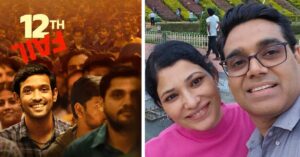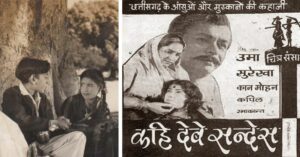Dhanush Biopic on Isaignani Ilaiyaraaja: The Real Story of India’s ‘Musical Sage’
Dhanush is all set to play Ilaiyaraaja in his biopic which is slated to release in 2025. Here's the inspiring story of the legendary composer.
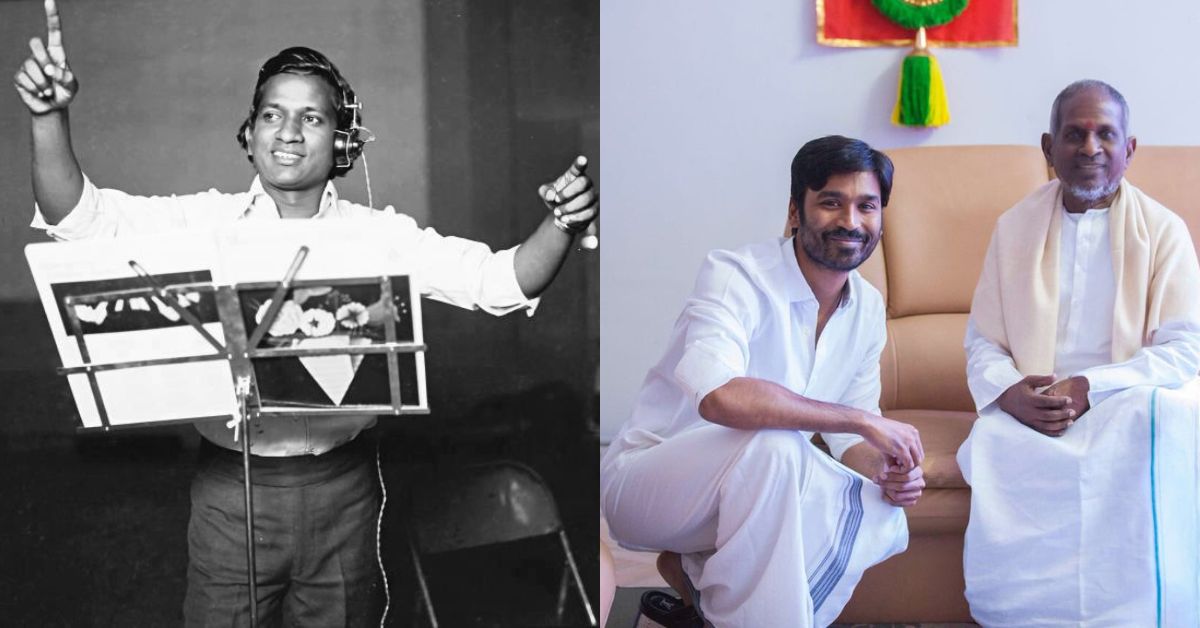
The name Ilaiyaraaja evokes a certain magic for his fans, who span across generations and countries. Everyone in my family has a favourite song, and a memory associated with the musician. Late nights and long drives are incomplete without his music playing in the background.
Sometime in 2021, I was travelling in Tamil Nadu by bus for work. I was not in a great mood and was just about to take out my headphones to listen to some music, when the driver started the bus. The buoyant ‘Rakkamma kaiya thattu’ started playing, transporting me to another world. I could instantly visualise Rajinikanth sashaying his hips and dancing in the way only he can. This song from the 1991 film Thalapathi had ranked fourth in the BBC World Service Top 10 songs in 2002.
A smile appeared on my face, and I saw that the lady sitting next to me was also humming along to the song. As we journeyed on the green-lined highway listening to other songs from the movie Thalapathi composed by Ilaiyaraaja, I could feel my troubles melting away.
Isn’t that one of the most beautiful things about music?
It’s also the spell that Raaja, as he is fondly called, casts on you. The composer, who turned 80 this June, has composed a song for every mood. Whether you’re feeling nostalgic, missing a loved one, thinking of your parents, or want to sing along at home with friends, there is a Raaja song.
As I returned to my old office that day, I remember spending the entire evening discussing this phenomenon with my former colleague and friend, Ashok Kumar. He said that every person in Tamil Nadu will have a story associated with a Raaja song.
“There are many composers who have produced good music. But whether you’re travelling or going through a rough patch, or if it’s after 10 PM, only Ilaiyaraaja’s songs will help,” he says.
For Ashok Sir, as I fondly call him, Raaja’s music is a soothing balm. Right from when his baby boy was in the hospital, or he was unwell during the COVID-19 pandemic, the maestro’s music came to his rescue.
In fact, he shares that he has a different song denoted for specific situations. If there’s a family problem, he listens to ‘Appan endrum Ammai endrum’ from Guna and during other challenging moments, he listens to the devotional album ‘Ramana Maalai’.
“I used to play the cassette of Ramana Maalai whenever I needed some strength. By the time the eight songs from Side A and B were played, I would be okay. The songs speak about how we have to overcome problems. They are simply a level above anything you will ever hear,” he adds.
Like Ashok Sir, there are many individuals who turn to Ilaiyaraaja’s music to sail through their life. And now, his impressive life will come alive on the big screen through a biopic in 2025. Dhanush will reportedly essay the role. With film trade analyst, Manobala Vijayabalan, confirming the news on X, Raaja’s fans cannot wait for this treat. Here’s a look at this legend’s musical journey and life, which started at the age of 14 in Pannaipuram, Theni, Tamil Nadu.
The making of a legend
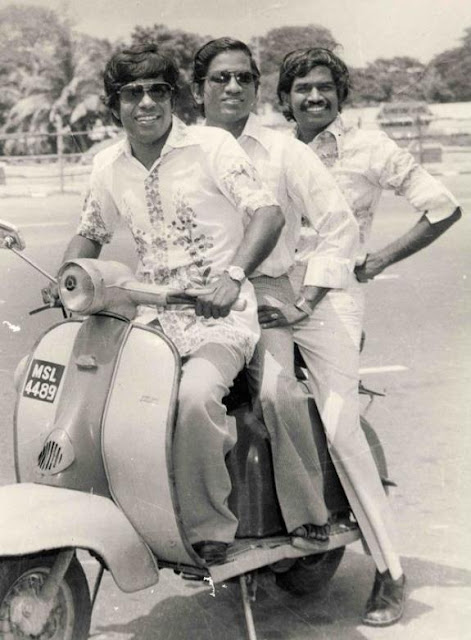
From being called as the ‘Maestro’ by the Royal Philharmonic Orchestra, London — and being the first Asian composer to record for them in 1993 — and ‘Isaignani‘ (the musical sage) by the late Tamil Nadu chief minister, Kalaignar M Karunanidhi, Ilaiyaraaja rose through several challenges to become the beloved artist that everyone loves him for.
Named Gnanathesigan at birth in 1943, he was greatly influenced by the rich folk songs he heard growing up. Though he had to drop out of school at 14, he accompanied his brother, Pavalar Varadarajan, on concerts across the state.
Varadarajan was a musician for the undivided Communist Party of India and sang songs with political themes. Raaja’s mother asked him to accompany his brother when he was sick and his musical tutelage began under him.
After accompanying Varadarajan for over a decade, he moved to Madras along with his other brothers, Bhaskar and Gangai Amaran (also a music director and lyricist) in 1968. With little money, the brothers were forced to vacate the lodge they were living in, but another singer arranged for their stay then.
While his talent was recognised and honed, Ilaiyaraaja didn’t even have bus fare on most days, and would walk long distances to learn music. He was learning western classical music under Dhanraj Master who then waived off his fees.
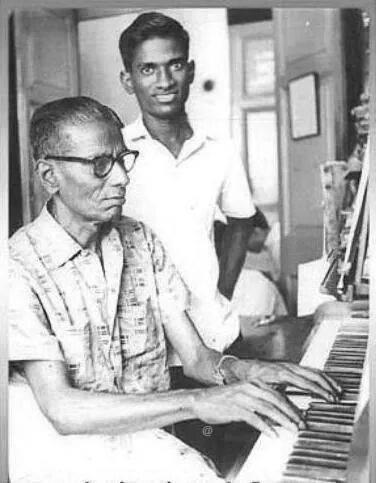
In an interview with The Hindu, the musician recalled that Dhanraj Master asked him to teach other students. “With a hungry stomach, I would do it. Intuitively, I learnt the notes. Once, overcome by hunger, I asked one of the students, Raja, to buy me a cup of tea and he immediately obliged,” Ilaiyaraaja explained then.
It was here that the then 25-year-old was introduced to the great stalwarts of classical music like Bach, Beethoven, Mozart, Schubert and more. Post this, he learnt classical guitar from the Trinity College of Music, London, where he was a gold medallist.
In the early 1970s, the maestro started working as a freelance musician and became the lead guitarist in music director Salil Chowdhury’s Chennai orchestra. Chowdhury had once famously said, “Our main guitarist in Chennai is the best composer in India.”
He was then spotted by Kannada film composer GK Venkatesh and assisted him in over 200 films. Here, he learnt composing and started writing his own compositions. He got his first break with film producer Panchu Arunachalam who asked him to compose six songs for his film Annakili in 1976. The music, which was folksy, was a hit and thus began the composer’s tryst with Tamil cinema.
When Ilaiyaraaja entered the music industry, Tamil cinema was dominated by the likes of MS Viswanathan and KV Mahadevan. With roots in folk, carnatic music and an education in western classical music, he ushered in a new musical era.
Initially though, his sensibilities didn’t match the popular hits. After trying to make music the way it was being composed at the time, he started experimenting and introduced new techniques and styles. He is credited with changing the way music is made in Tamil films. He was also one of the first Indian composers to use Western classical music and arrangements in his music.
Revolutionising the Tamil music industry
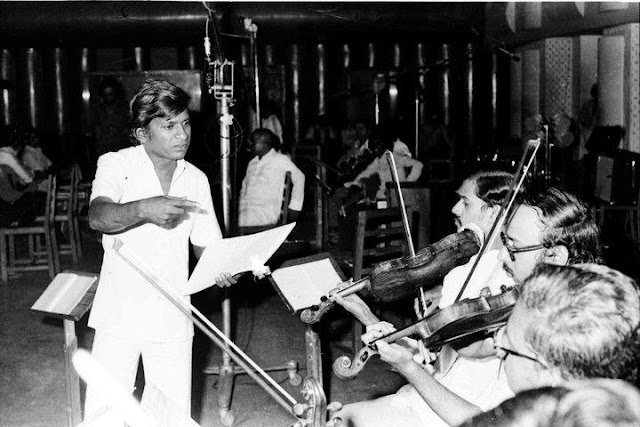
What sets Isaignani apart starts right from the way he composes his music. He reaches the studio early in the morning and writes the tune in the form of notations. He is one of the few composers who first write the notes and then play them. He is also known to write down the orchestrations in great detail.
He then starts composing at 7am and is known for being quick at it. In the 1985 drama film Uyarndha Ullam, he received a standing ovation from the 90 musicians in the orchestra after the recording was done.
“For a song in the movie, I planned to use a 90-piece orchestra. RD Burman’s assistants were coordinating the orchestra and when I said the musicians had to turn up at 7 am, they were taken aback. They were unsure of who’d turn up, considering they were used to working later in the day, but the next day, everybody was there. In half an hour, the orchestra was written, and once the entire song was done, every one of the 90 musicians gave me a standing ovation. That was special,” he told The Hindu.
He also once mentioned how he does not like the classification of music as “music everywhere is based on the seven notes (sapta swaram).”
“My perception is that there is no distinction in music as many people perceive. The difference lies in the way you hear the music. Your understanding of music depends on your capacity to perceive it,” he said in a function in Kerala in June 2005.
His music was for everyone and shunned the idea of Carnatic music purists who believe that it can be enjoyed only “by a few”. Ilaiyaraaja showed us why music should be inclusive through the beautiful ‘Paadariyen Padippariyen’ in K Balachander’s ‘Sindhu Bhairavi’ (1985).
In the movie, Carnatic musician JK Balaganapathi (Sivakumar) sings a composition by Tyagaraja, Mari Mari Ninne in an auditorium that includes Sindhu (Suhasini). To show the accessibility of classical music, Sindhu tells Balaganapathi after the performance that it would have been better if everyone could understand the lyrics and wonders if a folk composition could be included in a carnatic concert.
When he derides her, she sings ‘Paadariyen Padippariyen’ a Tamil folk song in the same Saramati raaga. Starting as a folk song, it beautifully transitions into the Carnatic Mari Mari Ninne, underscoring the point that there are no boundaries in music.
Speaking about this composition in a Sun TV interview, Ilaiyaraaja said that this was the only song that he did “homework” for.
“I wanted to infuse the folk song in the same raaga. I sat with the entire book of Tyagaraja compositions and worked on how it could be done. When I hummed Paadariyen Padippariyen, it perfectly sat in the same tune as Mari Mari Ninne. I told Balachander sir (the director of the movie) that there will be applause in the theatre after this song. I told him that I would stop composing if it didn’t happen,” Ilaiyaraaja had said.
As predicted, there was rapturous applause after the song in the theatre. The composer got a National award for Sindhu Bhairavi.
His use of western classical symphonies in the most unlikely situations is spectacular. His background scores lift the narrative of the movies and add to your cinematic experience. In a culture where people would clap for the heroes and create cutouts for them, fans started doing the same for Ilaiyaraaja in Tamil Nadu, such was his impact.
Besides Tamil cinema, he has also scored music for Telugu, Kannada, Malayalam and Hindi movies like Sadma, Paa, Cheeni Kum.
Ilaiyaraaja has also invented his own raaga called ‘Panchamukhi’.
What keeps him ticking?
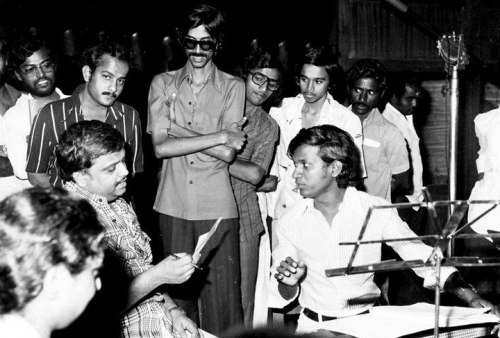
“A man settled in life with a secure job approaches life in a casual manner. But a man for whom most of the chances are closed approaches life with an all-out courage and from a new view point, which enables him to achieve a lot more than the former. I am like the latter. That is the reason for the freshness and novelty in my background score,” he had told The Frontline.
Ilaiyaraaja has composed over 8,000 songs in 1,000 films and has enthralled audiences through his concerts. He has been conferred with the Padma Bhushan, the Padma Vibhushan and five National Awards as well. Since July 2022, apart from being an ace musician, he has also been a Member of the Parliament.
Amazingly, he proves that music transcends all barriers.
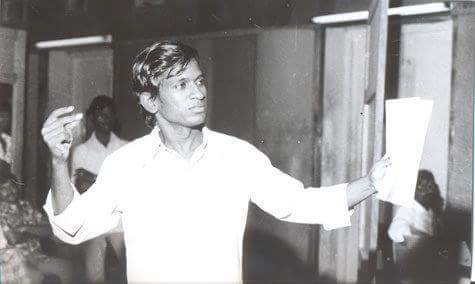
To drive home this point, Ashok Sir shares another anecdote related to Ilaiyaraaja. In 1994, when he was working at a restaurant in Madurai, a foreigner walked in one afternoon.
As Raaja’s music was playing in the background, he told them to “stop the Indian music” using an expletive. However, when he was paying the bill, Ashok Sir told him, “I would have had no issues if you had asked me to merely stop playing the music. But why did you have to say Indian music? On the way to your hotel, buy this cassette called ‘How to name it’ by Ilaiyaraaja. Listen to it to understand what Indian music is.”
Surprisingly, the man visited the restaurant the next day and asked for Ashok Sir. He gave him a Rs 500 tip and thanked him for introducing him to good music.
Ilaiyaraaja believes that music should come from the heart and should not be a task. “If you labour on creating music, it will not have soul,” he had once told The Hindu and that stands true.
So, what’s your Ilaiyaraaja story? If you found our stories insightful, informative, or even just enjoyable, we invite you to consider making a voluntary payment to support the work we do at The Better India. Your contribution helps us continue producing quality content that educates, inspires, and drives positive change. Choose one of the payment options below for your contribution- By paying for the stories you value, you directly contribute to sustaining our efforts focused on making a difference in the world. Together, let’s ensure that impactful stories continue to be told and shared, enriching lives and communities alike. Thank you for your support. Here are some frequently asked questions you might find helpful to know why you are contributing?

Edited by Padmashree Pande
Sources
Frontline
‘The Ilaiyaraaja interview: ‘Why should filmmakers know about music creation?’ by Srinivasa Ramanujam for The Hindu, Published on 31 May, 2018
‘Maestro remembers Dhanraj Master’ by B Kolappan for The Hindu, Published on 02 February, 2019
‘No point in classifying music, says Ilayaraja’ Published on 16 October, 2017 Courtesy The Hindu
This story made me
-
97
-
121
-
89
-
167






